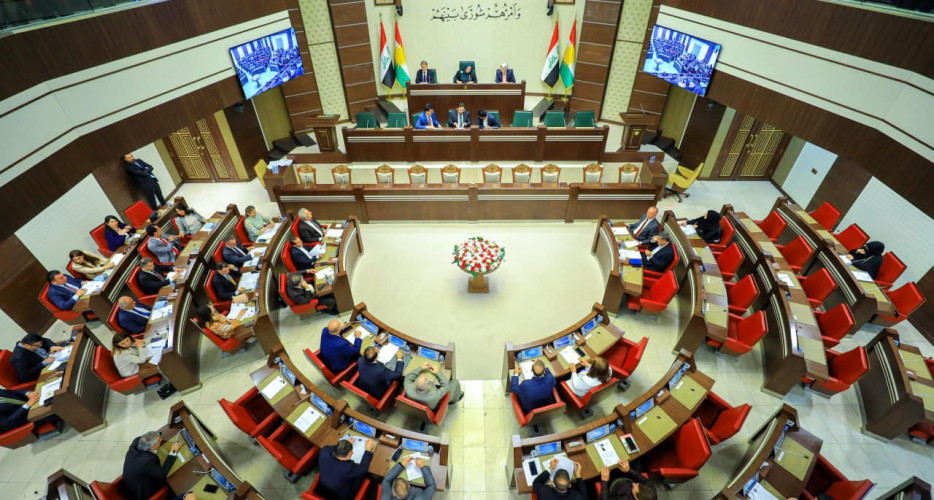Minority MPs fail to pass a single piece of legislation in last Kurdistan Parliament term

Peregraf- Farman Sadq
The Kurdistan Parliament did not pass a single legislative proposal from a representative of the minority ethnic and religious communities during its last term. The eleven seats reserved for Turkmens, Christians, and Armenians are intended to ensure not only their presence in parliament, but also to address the many problems that they face. Yet, they have little ability or will to take legislative action.
During the last term of the Kurdistan Parliament, which sat from February 2019 to November 2022, MPs debated 74 bills and resolutions and passed 46 of them, according to statistics on the parliament’s official website.
More than half of the total were proposed by parliamentary committees, party caucuses, or individual MPs, while the remainder came from the Kurdistan Regional Government (KRG) cabinet.
All proposed legislation must be approved by the parliamentary presidency for inclusion on the agenda. During the last term, the presidency included Speaker Rewaz Fayaq of the Patriotic Union of Kurdistan (PUK), Hemin Hawrami of the Kurdistan Democratic Party (KDP), and Muna Kevachi, herself a minority MP from the Turkmen Front.
According to an analysis by the Pay Institute for Education and Development, an NGO that monitors parliamentary affairs, the last term of the Kurdistan Parliament had modest legislative production. By its independent count, there were just 48 laws passed during the almost four years that it sat.
“The statistics of the parliament website may be flawed," Sarwar Abdulrahman, president of Pay Institute, told Peregraf.
However, by either count, not a single bill or resolution originally sponsored by a MP holding a reserved minority seat was accepted for consideration. There are five Turkmen MPs, five Christians, and one Armenian representative.
There was disagreement among sources about whether this was a deliberate policy on the part of the parliamentary presidency.
"The conflicts in parliament affected the minority parliamentary factions. The presidency did not prevent us from submitting proposals," said Azad Kurachi, a Turkmen MP. He said he had a bill ready for consideration, but that the presidency did not put it on the agenda.
Similarly, Farid Yaqub, the leader of the Christian RafidainParty in parliament, said that he had proposed a bill signed by 26 MPs to officially recognize the Semel massacre, but that it was not put on the agenda.
Speaker Fayeq denied that there was any discrimination related to accepting proposed legislation for consideration.
"The minorities had no bills to put on the agenda," Fayaq told Peregraf.
While some minority MPs were active in legislation proposed by MPs from other parties, many of the proposals that they suggested were complex and would have required additional legal procedures.
Some of their proposals, for example, related to the ownership of Turkmen and Christian land in Erbil and Duhok, which the MPs alleged are “occupied” by people and businesses belonging to the Kurdish majority. Certainly, this is the sort of issue that the minority MPs are in parliament to raise, but such matters are nevertheless controversial.
Hogar Cheto, a legal and electoral expert, told Peregraf that this suggested a failure to implement existing laws rather than pass new ones.
Minority MPs "have not been able to monitor the government," which is part of the work of parliamentarians,” said Cheto, who argued that they “are more submissive to the majority.”
The failure of minority MPs to act aggressively on behalf of their communities has caused some consternation.
"It is a tragedy that the Turkmen MPs have not submitted any bill to the speaker of parliament in the fifth session of parliament. History will not spare them," Emad Rafaat, a member of the Erbil Provincial Council from the Turkmen community, told Peregraf.
He cited several examples of issues related to Turkmen that he believes should be addressed in parliament, including the community’s cemeteries located in central Erbil that he said had been “ruined, neglected, and filled with garbage.”
Ongoing controversy
The issue of the reserved minority seats has roiled electoral politics in the Kurdistan Region for the past three years. Disagreements over whether their status and the procedures around electing them should be revisited were a major reason why elections for the next parliament have not yet been held.
The PUK and other parties claim that the minority MPs do not authentically represent the interest of their communities, but instead act as de facto KPD MPs.
The Federal Supreme Court is currently considering a lawsuit initiated by the PUK about whether to remove six of the eleven seats.
The Kurdistan Parliament is not sitting at the moment after the Federal Supreme Court ruled that its term ended in November 2022 and that the law extending the session was unconstitutional.
Abdulrahman told Peregraf that the role played by the minority MPs seems to be less about writing legislation than participating in other activities, including voting in the meetings of partyleaders and giving legitimacy on behalf of the minority communities for certain issues.
“If they are right and they had submitted bills to the speaker of parliament and they were not put on the agenda, they could have informed the public and their communities about their bill during a press conference [and said] that the Kurdistan Parliament presidency is preventing them,” he said.